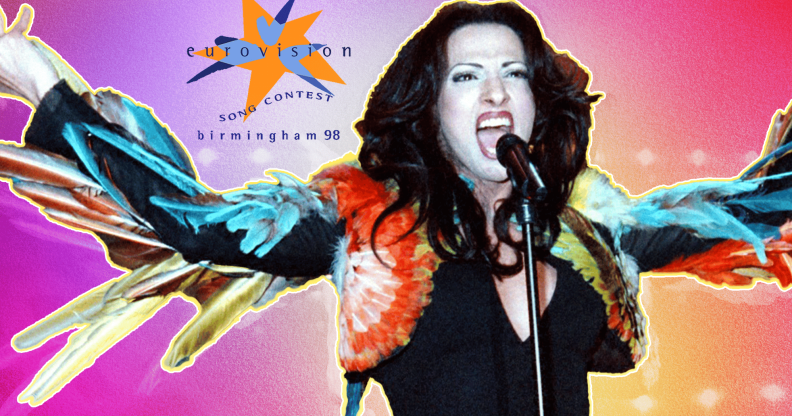The last time the UK hosted Eurovision was historic, chaotic and sublimely queer

Dana International won Eurovision ’98. (Getty/PinkNews)
The Eurovision Song Contest is officially returning to UK after 25 years – and as seven cities battle it out to host, here’s a trip down memory lane.
The UK will host Eurovision 2023 on behalf of 2022 winner Ukraine, with the ongoing war ruling them out of hosting on home turf, as is traditional.
On Friday (12 August) the BBC confirmed the shortlist of seven potential host cities: Birmingham, Glasgow, Leeds, Liverpool, Manchester, Newcastle and Sheffield.
The last the time UK hosted Eurovision was in 1998.
Birmingham had the honour following the victory of British rock band Katrina and the Waves in the ’97 contest, with their hit song “Love Shine a Light”.
From the first trans Eurovision winner, to the chaotic Guildo Horn and the UK breaking yet another record, the Eurovision ’98 was one to remember.
As the song contest got underway in the National Indoor Arena, it was clear that it was at the forefront of innovation, progress and inclusivity.
Dana International became first trans singer to win Eurovision

Dana International at Eurovision in Birmingham. (Peter Bischoff/Getty Images)
By far the most memorable moment has to be the astonishing victory of Israel’s entry, Dana International.
She made history by becoming the first – and to date, only – openly transgender person to win the Eurovision Song Contest.
She performed the song “Diva”, a catchy Hebrew song which captured the ears of the judges and voters.
Back in 2018, reflecting on her historic win, Dana told Attitiude: “Wow, it was like a dream come true. I can’t express the feeling, the energy – I was shivering, I was so happy. And I have never been as happy since that moment.
It is a blessing and it is a curse, because it is just Eurovision, but when I came from a Middle Eastern country to Birmingham, England and won the Eurovision its like I won the whole world. The feeling is so hard to express and I miss it so much.”
Despite winning over the public through her sheer talent and charisma, Dana was exposed to transphobia during the contest.
“The worst was during the show from the director who said: ‘I don’t care if it is a he, she or it,'” she said.
“And I was very offended by the use of ‘it’, because you can call me a he or a she, but you cannot call me an it.”
Imaani became first Black artist to represent the UK

Imaani, first Black performer to represent the UK at Eurovision. (Harold Cunningham/WireImage)
Imaani was the UK’s Eurovision ’98 entry, becoming the first Black artist to represent the nation in the contest.
She performed her hit single “Where Are You” and finished only seven points behind Dana International, extending the UK record for second place to 15. “Where Are You” reached the top 20 in the United Kingdom, The Netherlands and Belgium.
In an interview in 2015 Imaani reminisced on her journey to Eurovision and admitted that she originally refused to be a part of it. But after some convincing from friends and producers ,she decided to go for it.
In the end she performed against 24 other countries and in front of an audience of over 16,000 people.
“It was massive and something I’m really proud of,” she reflected.
The chaos of Guildo Horn

Guildo Horn performs at Eurovision contest. (YouTube)
And who can forget the absolute chaos that was Germany’s performer Guildo Horn.
His song, “Guildo hat euch lieb!” translates as “Guildo loves you”, and his performance was involved a swishing cape, crawling across the stage, running through the audience and unravelling a table of jingling bells.
The parody, tongue-in-cheek performance is credited with rekindling Germany’s interest in the competition and Guildo finished a very respectable seventh place.

